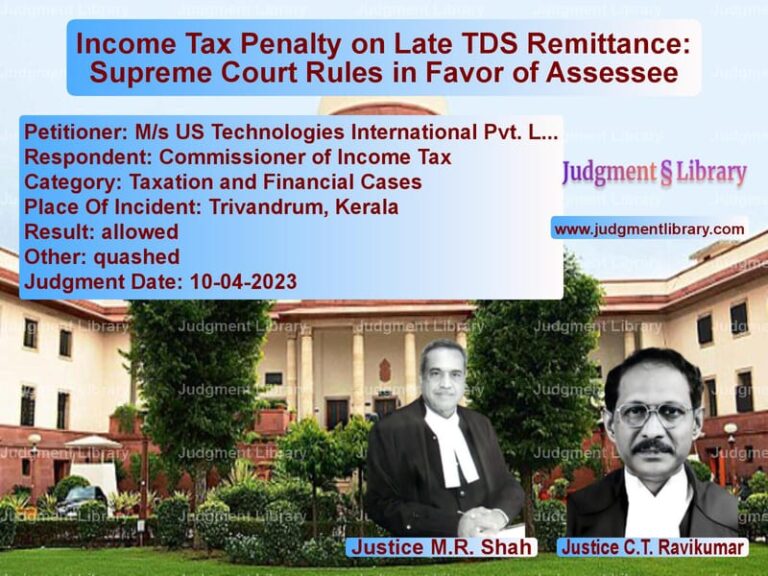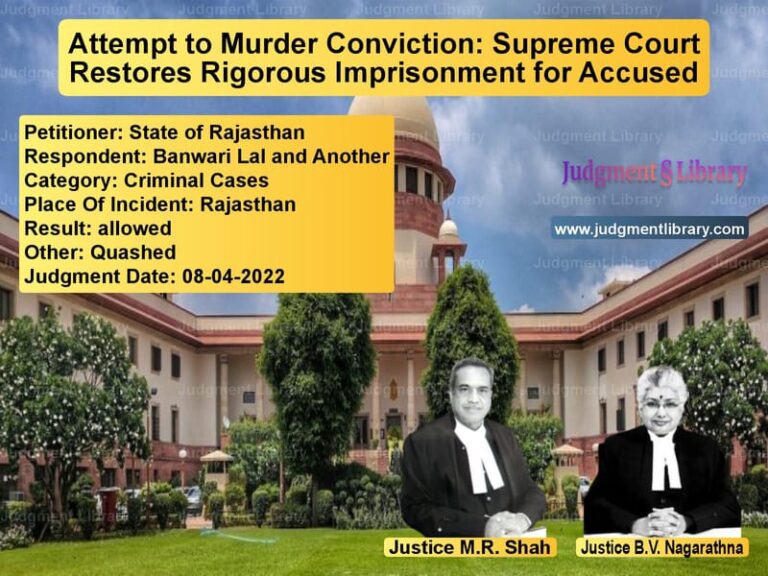Cheque Dishonour and Criminal Breach of Trust: Supreme Court Resolves Canara Bank Dispute
The Supreme Court of India recently delivered a crucial judgment in Pallav Sheth v. Canara Bank, a case involving cheque dishonour, financial misappropriation, and criminal breach of trust. The appeal revolved around an unpaid financial transaction where the appellant, Pallav Sheth, failed to honour his obligations to Canara Bank, resulting in a legal dispute over whether his actions constituted a criminal offence under Section 409 of the Indian Penal Code (IPC).
Background of the Case
The case arose from a series of transactions between Pallav Sheth and Canara Bank. The appellant had agreed to purchase 20,000 shares from Canara Bank at an agreed price of Rs. 83,00,000. As part of this agreement, he issued post-dated cheques to the bank, promising to settle the amount in due course.
However, when the bank presented the cheques for encashment, they were dishonoured. The appellant made multiple promises to clear the dues but consistently failed to do so. He even issued additional cheques and made further commitments to provide a pay order, all of which were not fulfilled. The bank subsequently filed a criminal case, alleging that Pallav Sheth had committed a breach of trust by taking possession of the shares without making the necessary payment.
The Special Court in Mumbai convicted the appellant under Section 409 IPC, sentencing him to six months of rigorous imprisonment and imposing a fine of Rs. 1,00,000. The appellant challenged this conviction before the Supreme Court, seeking relief based on his claim that the dispute was civil rather than criminal.
Legal Issues Considered by the Supreme Court
- Whether the appellant’s failure to honour the cheques amounted to criminal breach of trust under Section 409 IPC.
- Whether a settlement agreement between the parties could influence sentencing.
- Whether the Special Court correctly interpreted the concept of dishonest misappropriation in financial transactions.
Arguments by the Appellant (Pallav Sheth)
- The appellant argued that his failure to make payment was purely a civil matter and did not constitute a criminal offence.
- He maintained that the cheques were issued in the ordinary course of business and did not indicate fraudulent intent.
- He claimed that he had suffered financial difficulties, which led to the delay in making payments.
- He further submitted that he was willing to settle the dues with Canara Bank if a reasonable repayment plan was accepted.
Arguments by the Respondent (Canara Bank)
- The bank countered that the appellant had promised to make payment multiple times but failed to do so, indicating dishonest intent.
- The bank asserted that the appellant had taken possession of the shares with the clear understanding that payment would be made, making the failure to pay a case of criminal misappropriation.
- The bank pointed out that the appellant repeatedly issued cheques that were dishonoured and failed to comply with his commitments.
- The bank was willing to settle the matter but insisted that the full amount owed be paid.
Supreme Court’s Judgment
The Supreme Court upheld the conviction of the appellant but allowed for a settlement agreement to influence the sentencing. The key findings were:
- The appellant’s actions demonstrated dishonest intent, justifying his conviction under Section 409 IPC.
- The Special Court correctly concluded that the appellant had misappropriated the value of the shares.
- Given that both parties were open to settlement, the Court allowed the appellant to repay Rs. 2,03,10,400 at a reduced interest rate of 12% per annum instead of 18%.
- If the settlement was honoured, the appellant’s sentence would be considered served, and the fine of Rs. 1,00,000 would remain.
- If the appellant failed to pay within six months, he would have to serve the full six-month sentence.
The Court observed:
“Since the settlement indicated above has been accepted by the parties, the same is recorded as a part of this judgment and order.”
The judgment emphasized that financial misappropriation cases require careful scrutiny to determine whether they fall under civil or criminal jurisdiction. The Court reiterated that in cases involving criminal breach of trust, the presence of dishonest intent at the outset is a key factor in determining liability.
Impact of the Judgment
This ruling carries significant implications for financial and banking disputes:
- Reinforces that failure to honour financial obligations can lead to criminal prosecution under Section 409 IPC.
- Allows for settlements in financial disputes to influence sentencing while upholding the principle of legal accountability.
- Clarifies that dishonest misappropriation must be established through evidence of intent and repeated failure to meet obligations.
- Encourages out-of-court settlements while maintaining the legal framework for prosecuting financial fraud.
Conclusion
The Supreme Court’s decision in this case strikes a balance between legal enforcement and the possibility of settlement in financial disputes. By affirming the conviction but allowing for a settlement-based resolution, the Court acknowledged the need to uphold financial integrity while providing an avenue for debt recovery. This ruling will serve as an important precedent for future cases involving cheque dishonour and financial misappropriation.
Don’t miss out on the full details! Download the complete judgment in PDF format below and gain valuable insights instantly!
Download Judgment: Pallav Sheth vs Canara Bank Supreme Court of India Judgment Dated 13-04-2016-1741854571912.pdf
Direct Downlaod Judgment: Direct downlaod this Judgment
See all petitions in Fraud and Forgery
See all petitions in Theft and Robbery Cases
See all petitions in Judgment by Dipak Misra
See all petitions in Judgment by Shiva Kirti Singh
See all petitions in partially allowed
See all petitions in settled
See all petitions in supreme court of India judgments April 2016
See all petitions in 2016 judgments
See all posts in Criminal Cases Category
See all allowed petitions in Criminal Cases Category
See all Dismissed petitions in Criminal Cases Category
See all partially allowed petitions in Criminal Cases Category







